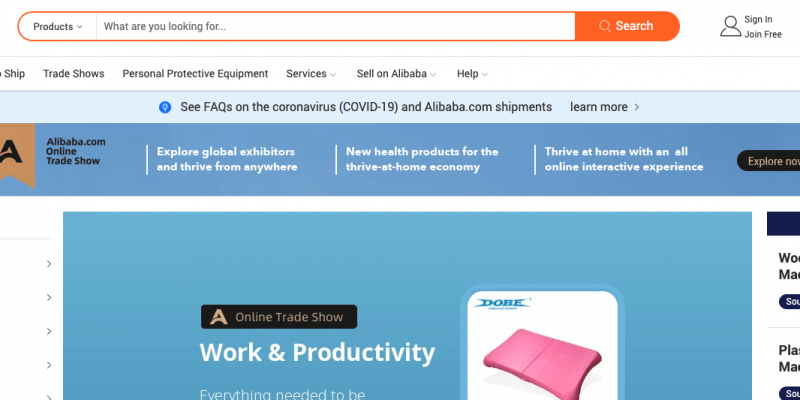So Global Sources Vs Alibaba? Which supplier database is the best? The B2B platform you choose can have a significant impact on your business. As two of the premier B2B platforms on the internet, Alibaba and Global sources have both been in business for decades. Global Sources was one of the first B2B platforms on the internet, and it was started in 1970 by Trade Media LTD. but then appeared on the internet in 1996.
Alibaba started in 1999 and has grown to become one of the biggest companies in the world – including its subsidiaries AliPay and AliExpress. Alibaba had the biggest IPO of any company in history, reaching $25B in 2014. While similar in features, Global Sources and Alibaba can vary significantly based on the industry. This guide will focus on the main differences between Alibaba and Global Sources.
Global Sources recorded $140,000,000 in profits while Alibaba’s profits exceed $50B. While Alibaba holds a much larger share of the Chinese supplier market, there are many benefits to sourcing on Global Sources, including higher seller filter criteria and access to higher-quality products.
Global Sources is probably the top competitor to Alibaba– however, they are not the only other option. The teams at Sourcinghub.io and Cosmo Sourcing work together and are continually updating the master list of every Alibaba alternative for sourcing around the world. You can view the full list by clicking below!
Alibaba Vs. Global Sources // Size & History
Alibaba is the biggest e-commerce website in the world. Alibaba has a firm grip on the Chinese manufacturing sector, including global e-commerce. After reaching the highest IPO in world history, Alibaba became the king of the e-commerce world and is now the premier source for all Chinese products shipping globally. Most traders with basic experience importing from China have tried Alibaba at least once in their lives. Jack Ma, the founder of Alibaba, is currently worth over $40B as a result of the site’s success.
However, if we go far back enough to the time, Alibaba wasn’t the king of global commerce, the company that started it all is: Global Sources.
Most people are shocked when they find out Global Sources has existed for 50 years – it was started way by two Americans, Merle Hinrichs, and Joseph Bendy, way back in 1970. When American businesses started outsourcing to Asia in a significant way, Global Sources was one of the first attempts to prop up Asian factories and trading companies in the Western world. The company was previously a print catalog, and it didn’t exist in its current form until 1996 when it launched as a major supplier website. Global Sources organizes two trade summits per year.
WINNER: Global Sources. Alibaba is bigger, but Global Sources is older. Both companies have a track record of decades of work in the supplier business.
Alibaba Vs. Global Sources // Product Availability
The most significant difference between Alibaba and Global Sources is in product selection. While Global Sources specializes in electronics, mobile accessories, gifts, and fashion, Alibaba tends to have virtually all kinds of products. Global Sources holds trade shows twice a year, where buyers can personally meet and vet their suppliers to browse their products in person. These trade shows provide an opportunity for new buyers to experience a wide range of products and find out which product they want to focus on while building relationships with their future suppliers.
Global Sources has the edge over Alibaba in the product quality category because most traders agree the website offers higher-quality products and a better filtering/vetting system for suppliers. They are also slightly more reliable when it comes to international export, and they deal with international clients in a more personal way.
After all, Global Sources was founded by two Americans, and this makes it easier to navigate for Western buyers – including contacting the company directly. Alibaba may not provide the support you need if you run into trouble with a supplier, while Global Sources tends to offer excellent support. Global Sources is generally the better choice for businesses that rely on products in the electronics/mobile sphere, including home gifts/decorations. While on Alibaba you may be able to find the same products, the quality will generally be lower than on Global Sources.
WINNER: Alibaba. Alibaba has a broader selection of products with millions of products available across all niches. Global Sources has better niche products in electronics, mobile, and home accessories. However, Global Sources is better if you are looking for private-label products.
Global Sources Vs Alibaba // Reputation
Alibaba and Global Sources both enjoy an excellent reputation among businesses. Still, Alibaba has had negative experiences with the US Trade Representative – Alibaba was blacklisted for years due to a high number of counterfeit goods sold on the platform. There were numerous reports of pirated goods selling on Alibaba. Global Sources enjoys a better reputation as far as product selection and hasn’t run in trouble with the law.
Alibaba was put on the USTR blacklist for nearly five years, and it was removed from the blacklist in 2016. Alibaba has a severe authenticity problem on its website, which does not exist on the same level on Global Sources. Alibaba made significant efforts to improve on the issue of counterfeit/authenticity products.
Alibaba’s biggest problem is counterfeit products in the fashion industry, where Alibaba spent millions of dollars hiring special teams in their quality-control department to take down obvious counterfeit items. The company had a minor scandal in 2014 when the founder, Jack Ma, claimed the fakes sold on Alibaba were of “better quality and price than the real ones.”
WINNER: Global Sources. Alibaba has a major problem with counterfeit products, especially in the fashion industry. Most items on Global Sources are original.
Alibaba Vs. Global Sources // Quality Sourcing Comparison
The ultimate comparison is the quality control of Alibaba and Global Sources – especially when it comes to supplier approval. Alibaba tends to simplify the process of suppliers registering for their website, which means they have millions of suppliers selling items on their platform. Global sources stricter requirements for their suppliers results in saturation, inferior quality products, false supplier claims, and agents who have a hard time speaking English. While the choice of products is far higher, so is the chance of running into a bad supplier.
Alibaba tried to regulate their marketplace by establishing “Gold Supplier” ratings. While the “Gold” supplier rating appears as if Alibaba supports the supplier, this only means the supplier bought the rating from the company. The suppliers only have to perform a single onsite check before they receive a badge from Alibaba. However, this verification doesn’t have an impact on quality control. Global Sources filters their suppliers in a much stricter way, and they analyze the goods for quality before they permit them on their website.
WINNER: Global Sources. The supplier process is deregulated on Alibaba, which means thousands of unreliable suppliers are currently selling their products on the website. Global Sources has a stricter regulation process for suppliers.
Conclusion // Which Supplier Database Is Better?
We conclude that although Alibaba is superior regarding product variety, Global Sources is far more reliable and offers higher-quality products. Global Sources is also easier to navigate because it was founded by Americans and provides superior support for Western clients. Global Sources specializes in electronics, mobile, and home gift niches, which makes it the optimal choice for sourcing products in that area. Alibaba offers an all-around opportunity from millions of products, and the US government has blacklisted it due to many counterfeit items being sold on the website.




